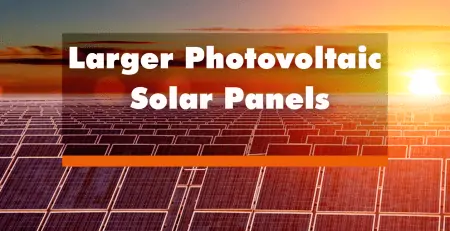Solar panel for home
Solar panels for homes have become increasingly popular in recent years as people seek to reduce their carbon footprint and save on energy costs. Solar panels, which are made up of photovoltaic cells that convert sunlight into electricity, provide a renewable and sustainable source of energy for households.
Types of Solar Panels for Home
There are several types of solar panels available for residential use, each with its own unique advantages and disadvantages.
Monocrystalline solar panels are made from a single silicon crystal and are known for their high-efficiency rates, typically ranging from 15% to 20%.
Polycrystalline solar panels are made from multiple silicon crystals and are slightly less efficient than monocrystalline panels, typically ranging from 13% to 16% efficiency.
Thin-film solar panels are made from a thin layer of photovoltaic material and are the least efficient type of panel, typically ranging from 7% to 13% efficiency.
Factors that Affect Home Solar Panel Costs
Several factors can impact the cost of installing solar panels on a home, including panel efficiency and durability, location, climate and weather, and government incentives and rebates.
Panel efficiency and durability are important considerations as they can impact the upfront cost of the installation and long-term savings. More efficient and durable panels, such as monocrystalline panels, may cost more upfront but can provide greater energy savings over time.
Location, climate, and weather can also impact the installation process and the total cost. Homes in areas with high solar insolation, or the amount of sunlight received, may require fewer panels to generate the same amount of electricity, reducing the overall cost.
Government incentives and rebates can help offset the cost of installing solar panels and make them more accessible for homeowners.
Average Cost of Home Solar Panels
As of 2021, the average cost of installing solar panels in the US ranges from $11,144 to $14,696 for a 6-kilowatt (kW) system. The cost varies depending on various factors such as the size of the system, panel efficiency, and location.
The cost of solar panel installation around the world also varies depending on location and other factors. In Australia, the average cost of a 6-kW solar panel system is around AUD 5,000 to AUD 9,000. In the UK, the cost of installing a 4-kW solar panel system ranges from £4,000 to £6,000. In India, the cost of installing a 1-kW solar panel system is around INR 50,000 to INR 70,000.
Financing Options for Home Solar Panel Installation
There are several financing options available to homeowners who want to install solar panels, including leasing, loan programs, and power purchase agreements (PPAs).
- Leasing: Solar panel leasing is a popular financing option that allows homeowners to rent solar panels from a company in exchange for a monthly fee.
- Loan programs: Homeowners can also take out loans specifically designed for solar panel installation.
- Power purchase agreements (PPAs): A PPA is a contract between a homeowner and a third-party solar company..
Choosing a Solar Panel Installer
Here are some tips for researching and selecting a reliable solar panel installer:
- Check certifications and licenses: Look for solar installers who are licensed and certified by reputable organizations, such as the North American Board of Certified Energy Practitioners (NABCEP).
- Read reviews and references: Check online reviews and references from previous customers to get an idea of the installer’s reputation and quality of work. Ask the installer for references and contact them to ask about their experience with the installer.
- Consider experience and expertise: Look for solar installers who have several years of experience and specialize in solar panel installation. Ask about their experience with the type of solar panel system you want to install and their familiarity with local regulations and incentives.
- Compare quotes: Get quotes from multiple solar panel installers to compare pricing and services. Be wary of installers who offer significantly lower prices than others, as this may indicate lower quality work or hidden fees.
- Ask questions: Before signing a contract with a solar panel installer, ask questions to clarify any concerns or uncertainties. Here are some key questions to ask:
- What type of solar panel system do you recommend for my home and why?
- How many installations have you done? Can you provide references?
- What warranties and guarantees do you offer for the solar panel system and installation?
- What is the estimated timeline for installation and when can I expect the system to start generating power?
- Can you provide an estimate of the energy output and savings I can expect from the system?
Maintaining and Caring for Home Solar Panels
Here are some tips on how to properly care for and maintain solar panels:
- Check for damage: Inspect the solar panels regularly for any signs of damage, such as cracks or corrosion. If any damage is found, contact a professional solar panel technician to repair or replace the affected panels.
- Clean the panels: Dirt, dust, and debris can accumulate on the solar panels and reduce their efficiency. Clean the panels with a soft brush or cloth and non-abrasive soap and water. Avoid using harsh chemicals or abrasive materials, as they can damage the panels.
- Trim nearby trees: Trees and other vegetation can cast shadows on the solar panels and reduce their efficiency.
- Check the inverter: The inverter converts the direct current (DC) generated by the solar panels into alternating current (AC) that can be used in the home. Check the inverter regularly to ensure it is working properly.
- Monitor energy output: Keep track of the energy output of the solar panels to ensure they are operating at peak efficiency.
Conclusion
In this blog post, we have discussed the benefits and costs of home solar panel installation, including potential energy savings, environmental impact, and financial considerations. We have explored the different types of solar panels available and the factors that can affect their efficiency and cost.


